Business Law Negotiation and Conflict Resolution Assignment Analysis
VerifiedAdded on 2022/09/10
|8
|1899
|13
Homework Assignment
AI Summary
This assignment presents a negotiation case study involving Brandon, a highly valued engineer requesting a salary increase. The assignment requires an analysis of Brandon's interests, exploring various alternatives the company could offer if they cannot meet his pay raise demand, such as side projects, job swaps, or personal perks. The assignment also explores Brandon's interests in the negotiation, including his desire for comparable pay, recognition for his challenging work, and overall job satisfaction. Furthermore, the assignment requires an assessment of Brandon's potential alternatives if he does not reach an agreement with his boss, including staying with the current pay, seeking employment elsewhere, or accepting alternative offers. The assignment concludes with a discussion of Brandon's BATNA (Best Alternative To a Negotiated Agreement) and why it represents his best course of action. The student provides their own perspective on what they would do in Brandon's situation, weighing the pros and cons of various options.
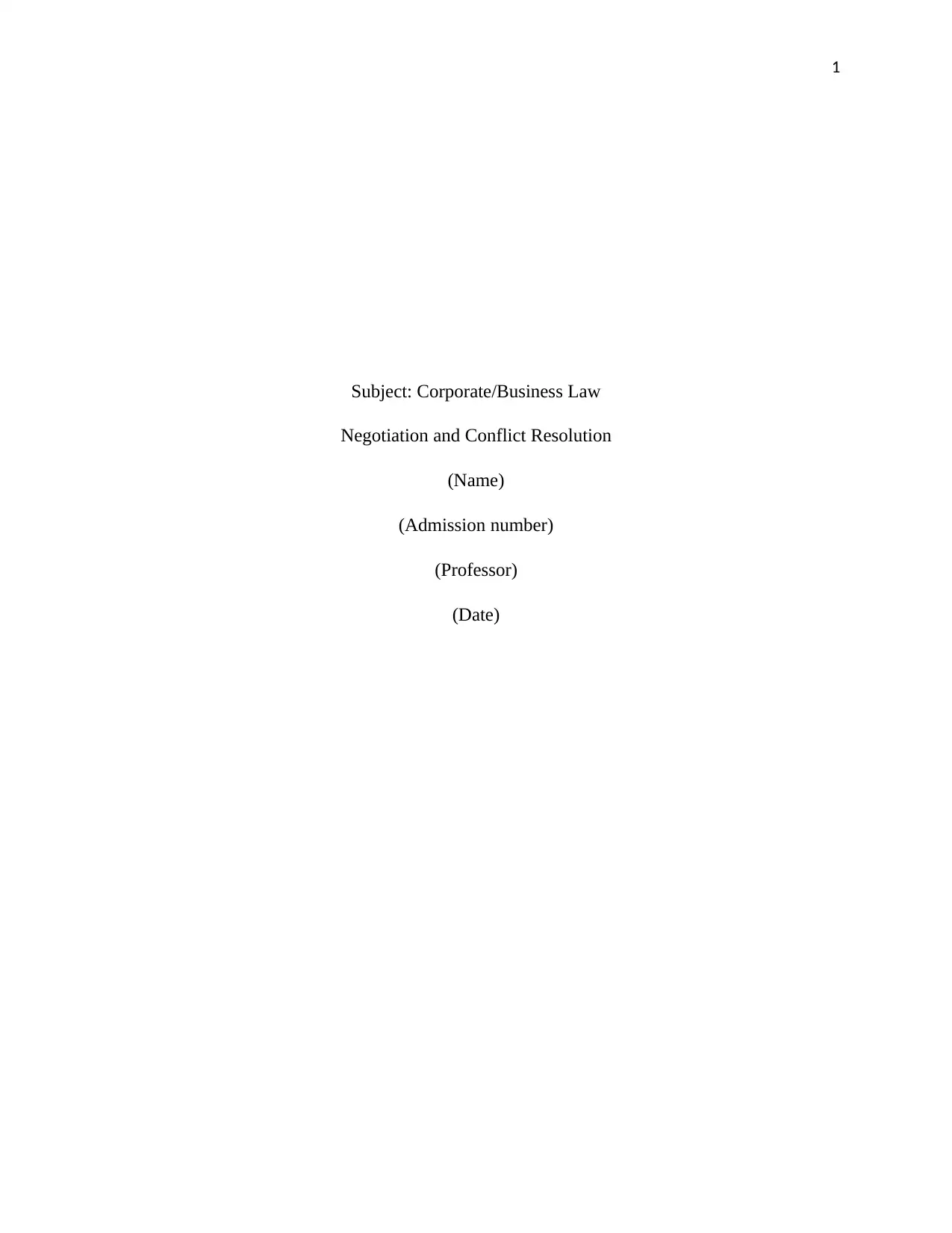
1
Subject: Corporate/Business Law
Negotiation and Conflict Resolution
(Name)
(Admission number)
(Professor)
(Date)
Subject: Corporate/Business Law
Negotiation and Conflict Resolution
(Name)
(Admission number)
(Professor)
(Date)
Paraphrase This Document
Need a fresh take? Get an instant paraphrase of this document with our AI Paraphraser
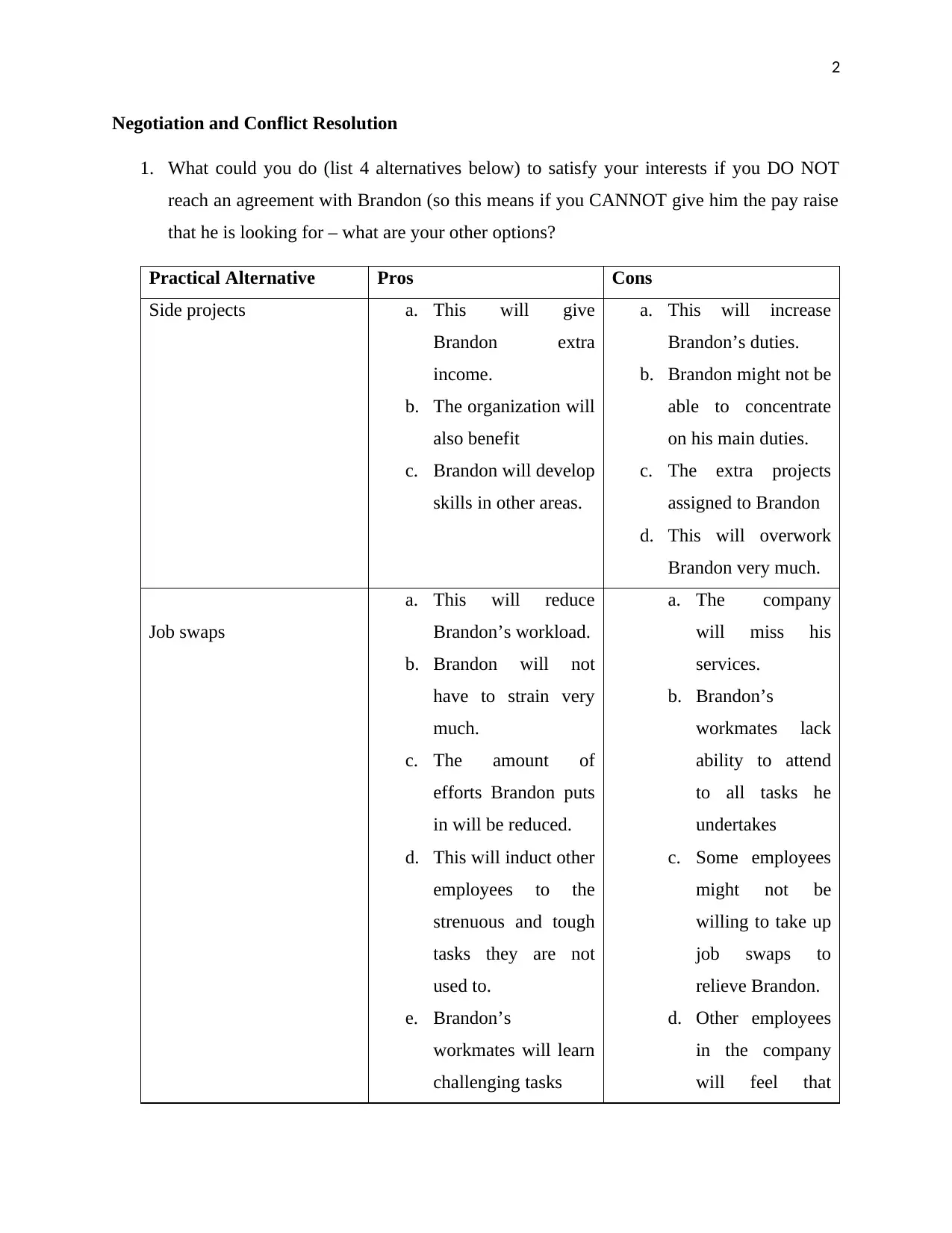
2
Negotiation and Conflict Resolution
1. What could you do (list 4 alternatives below) to satisfy your interests if you DO NOT
reach an agreement with Brandon (so this means if you CANNOT give him the pay raise
that he is looking for – what are your other options?
Practical Alternative Pros Cons
Side projects a. This will give
Brandon extra
income.
b. The organization will
also benefit
c. Brandon will develop
skills in other areas.
a. This will increase
Brandon’s duties.
b. Brandon might not be
able to concentrate
on his main duties.
c. The extra projects
assigned to Brandon
d. This will overwork
Brandon very much.
Job swaps
a. This will reduce
Brandon’s workload.
b. Brandon will not
have to strain very
much.
c. The amount of
efforts Brandon puts
in will be reduced.
d. This will induct other
employees to the
strenuous and tough
tasks they are not
used to.
e. Brandon’s
workmates will learn
challenging tasks
a. The company
will miss his
services.
b. Brandon’s
workmates lack
ability to attend
to all tasks he
undertakes
c. Some employees
might not be
willing to take up
job swaps to
relieve Brandon.
d. Other employees
in the company
will feel that
Negotiation and Conflict Resolution
1. What could you do (list 4 alternatives below) to satisfy your interests if you DO NOT
reach an agreement with Brandon (so this means if you CANNOT give him the pay raise
that he is looking for – what are your other options?
Practical Alternative Pros Cons
Side projects a. This will give
Brandon extra
income.
b. The organization will
also benefit
c. Brandon will develop
skills in other areas.
a. This will increase
Brandon’s duties.
b. Brandon might not be
able to concentrate
on his main duties.
c. The extra projects
assigned to Brandon
d. This will overwork
Brandon very much.
Job swaps
a. This will reduce
Brandon’s workload.
b. Brandon will not
have to strain very
much.
c. The amount of
efforts Brandon puts
in will be reduced.
d. This will induct other
employees to the
strenuous and tough
tasks they are not
used to.
e. Brandon’s
workmates will learn
challenging tasks
a. The company
will miss his
services.
b. Brandon’s
workmates lack
ability to attend
to all tasks he
undertakes
c. Some employees
might not be
willing to take up
job swaps to
relieve Brandon.
d. Other employees
in the company
will feel that
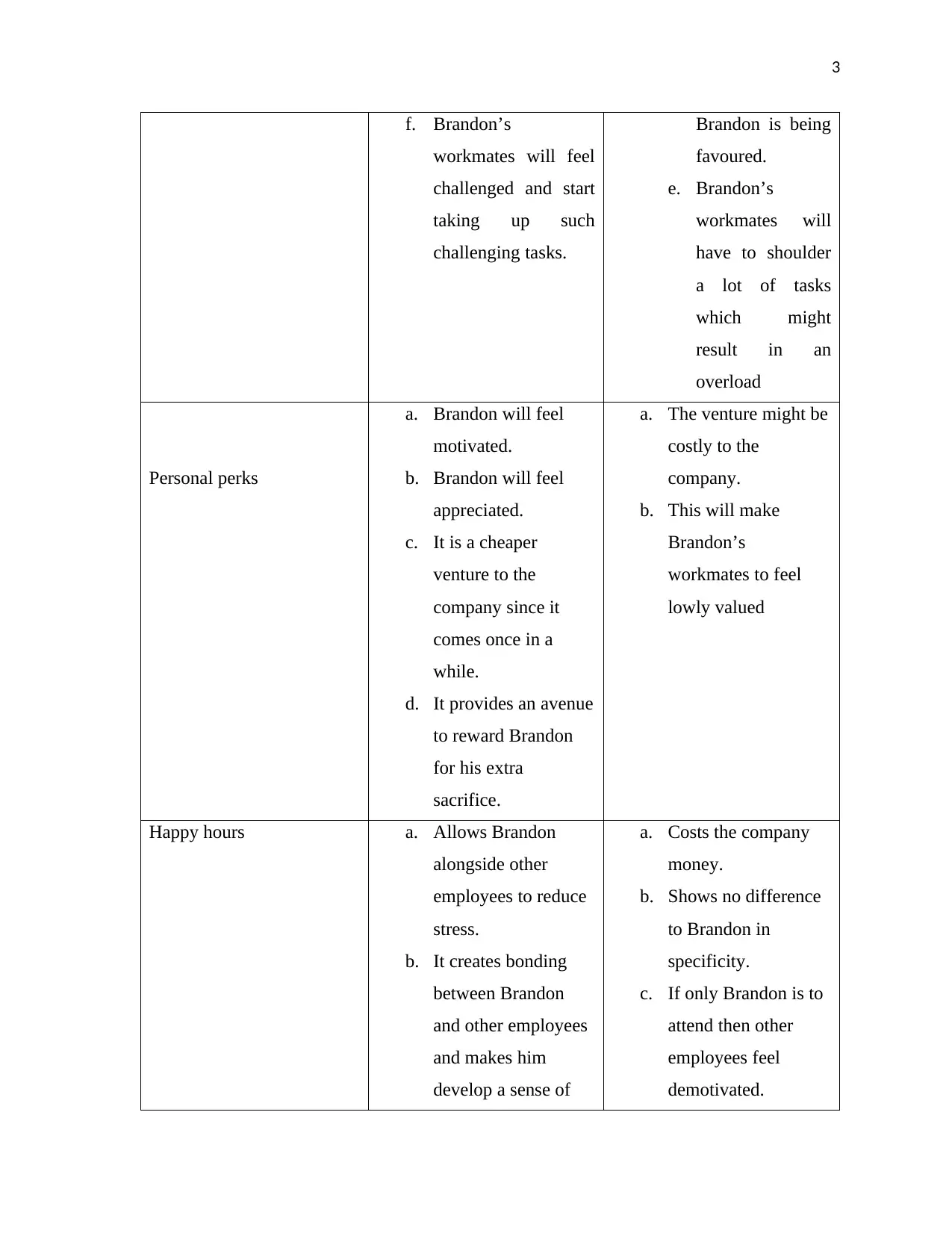
3
f. Brandon’s
workmates will feel
challenged and start
taking up such
challenging tasks.
Brandon is being
favoured.
e. Brandon’s
workmates will
have to shoulder
a lot of tasks
which might
result in an
overload
Personal perks
a. Brandon will feel
motivated.
b. Brandon will feel
appreciated.
c. It is a cheaper
venture to the
company since it
comes once in a
while.
d. It provides an avenue
to reward Brandon
for his extra
sacrifice.
a. The venture might be
costly to the
company.
b. This will make
Brandon’s
workmates to feel
lowly valued
Happy hours a. Allows Brandon
alongside other
employees to reduce
stress.
b. It creates bonding
between Brandon
and other employees
and makes him
develop a sense of
a. Costs the company
money.
b. Shows no difference
to Brandon in
specificity.
c. If only Brandon is to
attend then other
employees feel
demotivated.
f. Brandon’s
workmates will feel
challenged and start
taking up such
challenging tasks.
Brandon is being
favoured.
e. Brandon’s
workmates will
have to shoulder
a lot of tasks
which might
result in an
overload
Personal perks
a. Brandon will feel
motivated.
b. Brandon will feel
appreciated.
c. It is a cheaper
venture to the
company since it
comes once in a
while.
d. It provides an avenue
to reward Brandon
for his extra
sacrifice.
a. The venture might be
costly to the
company.
b. This will make
Brandon’s
workmates to feel
lowly valued
Happy hours a. Allows Brandon
alongside other
employees to reduce
stress.
b. It creates bonding
between Brandon
and other employees
and makes him
develop a sense of
a. Costs the company
money.
b. Shows no difference
to Brandon in
specificity.
c. If only Brandon is to
attend then other
employees feel
demotivated.
⊘ This is a preview!⊘
Do you want full access?
Subscribe today to unlock all pages.

Trusted by 1+ million students worldwide
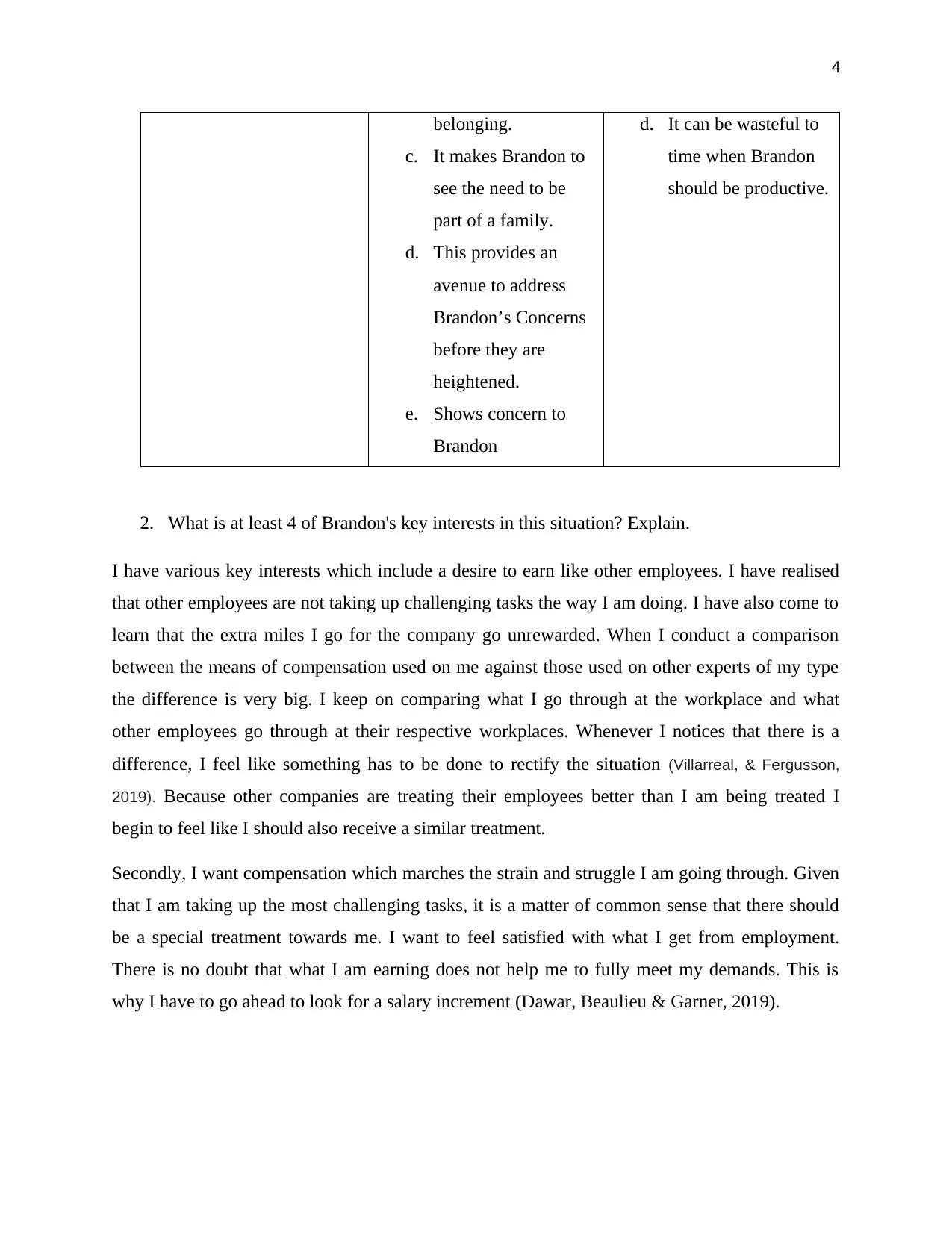
4
belonging.
c. It makes Brandon to
see the need to be
part of a family.
d. This provides an
avenue to address
Brandon’s Concerns
before they are
heightened.
e. Shows concern to
Brandon
d. It can be wasteful to
time when Brandon
should be productive.
2. What is at least 4 of Brandon's key interests in this situation? Explain.
I have various key interests which include a desire to earn like other employees. I have realised
that other employees are not taking up challenging tasks the way I am doing. I have also come to
learn that the extra miles I go for the company go unrewarded. When I conduct a comparison
between the means of compensation used on me against those used on other experts of my type
the difference is very big. I keep on comparing what I go through at the workplace and what
other employees go through at their respective workplaces. Whenever I notices that there is a
difference, I feel like something has to be done to rectify the situation (Villarreal, & Fergusson,
2019). Because other companies are treating their employees better than I am being treated I
begin to feel like I should also receive a similar treatment.
Secondly, I want compensation which marches the strain and struggle I am going through. Given
that I am taking up the most challenging tasks, it is a matter of common sense that there should
be a special treatment towards me. I want to feel satisfied with what I get from employment.
There is no doubt that what I am earning does not help me to fully meet my demands. This is
why I have to go ahead to look for a salary increment (Dawar, Beaulieu & Garner, 2019).
belonging.
c. It makes Brandon to
see the need to be
part of a family.
d. This provides an
avenue to address
Brandon’s Concerns
before they are
heightened.
e. Shows concern to
Brandon
d. It can be wasteful to
time when Brandon
should be productive.
2. What is at least 4 of Brandon's key interests in this situation? Explain.
I have various key interests which include a desire to earn like other employees. I have realised
that other employees are not taking up challenging tasks the way I am doing. I have also come to
learn that the extra miles I go for the company go unrewarded. When I conduct a comparison
between the means of compensation used on me against those used on other experts of my type
the difference is very big. I keep on comparing what I go through at the workplace and what
other employees go through at their respective workplaces. Whenever I notices that there is a
difference, I feel like something has to be done to rectify the situation (Villarreal, & Fergusson,
2019). Because other companies are treating their employees better than I am being treated I
begin to feel like I should also receive a similar treatment.
Secondly, I want compensation which marches the strain and struggle I am going through. Given
that I am taking up the most challenging tasks, it is a matter of common sense that there should
be a special treatment towards me. I want to feel satisfied with what I get from employment.
There is no doubt that what I am earning does not help me to fully meet my demands. This is
why I have to go ahead to look for a salary increment (Dawar, Beaulieu & Garner, 2019).
Paraphrase This Document
Need a fresh take? Get an instant paraphrase of this document with our AI Paraphraser
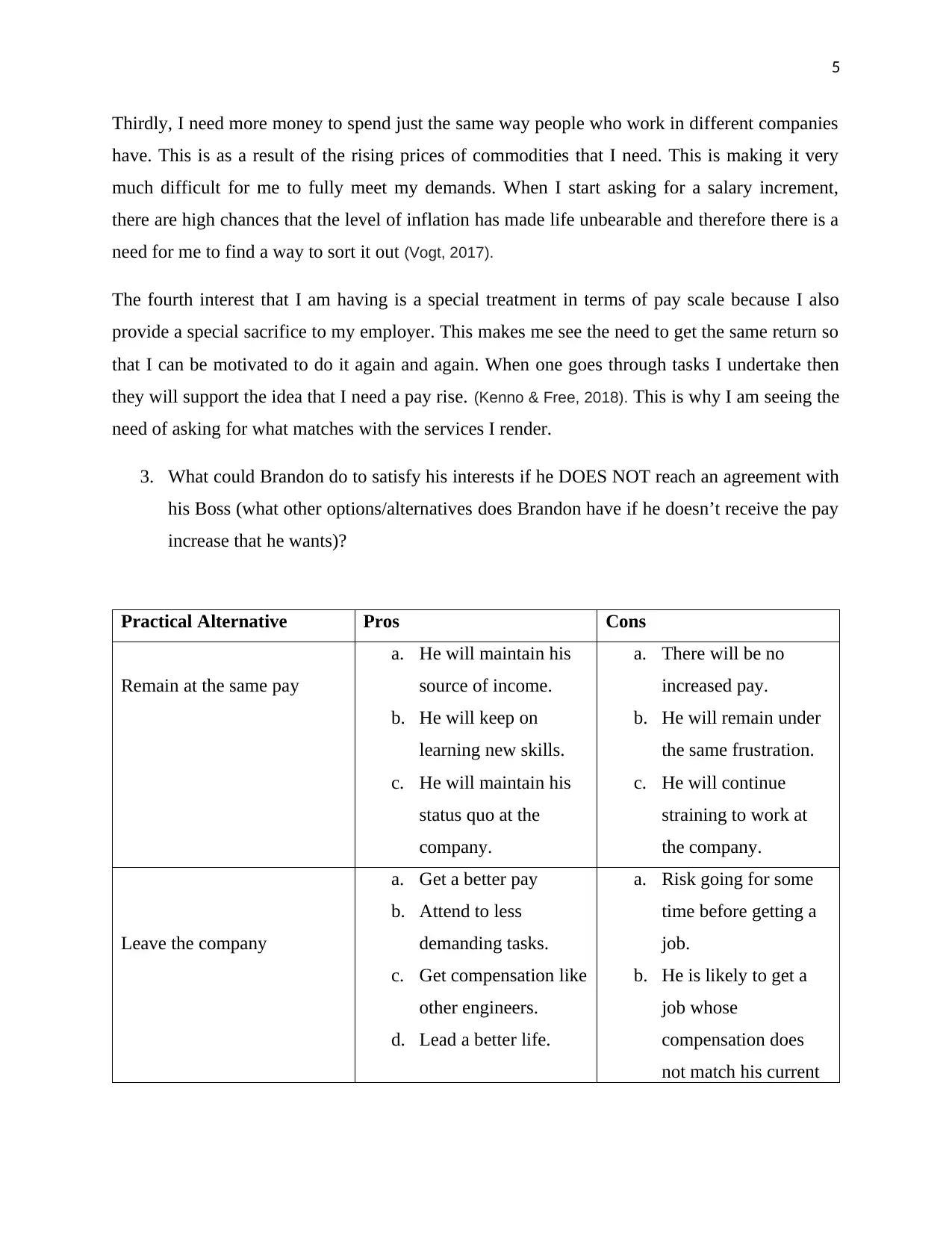
5
Thirdly, I need more money to spend just the same way people who work in different companies
have. This is as a result of the rising prices of commodities that I need. This is making it very
much difficult for me to fully meet my demands. When I start asking for a salary increment,
there are high chances that the level of inflation has made life unbearable and therefore there is a
need for me to find a way to sort it out (Vogt, 2017).
The fourth interest that I am having is a special treatment in terms of pay scale because I also
provide a special sacrifice to my employer. This makes me see the need to get the same return so
that I can be motivated to do it again and again. When one goes through tasks I undertake then
they will support the idea that I need a pay rise. (Kenno & Free, 2018). This is why I am seeing the
need of asking for what matches with the services I render.
3. What could Brandon do to satisfy his interests if he DOES NOT reach an agreement with
his Boss (what other options/alternatives does Brandon have if he doesn’t receive the pay
increase that he wants)?
Practical Alternative Pros Cons
Remain at the same pay
a. He will maintain his
source of income.
b. He will keep on
learning new skills.
c. He will maintain his
status quo at the
company.
a. There will be no
increased pay.
b. He will remain under
the same frustration.
c. He will continue
straining to work at
the company.
Leave the company
a. Get a better pay
b. Attend to less
demanding tasks.
c. Get compensation like
other engineers.
d. Lead a better life.
a. Risk going for some
time before getting a
job.
b. He is likely to get a
job whose
compensation does
not match his current
Thirdly, I need more money to spend just the same way people who work in different companies
have. This is as a result of the rising prices of commodities that I need. This is making it very
much difficult for me to fully meet my demands. When I start asking for a salary increment,
there are high chances that the level of inflation has made life unbearable and therefore there is a
need for me to find a way to sort it out (Vogt, 2017).
The fourth interest that I am having is a special treatment in terms of pay scale because I also
provide a special sacrifice to my employer. This makes me see the need to get the same return so
that I can be motivated to do it again and again. When one goes through tasks I undertake then
they will support the idea that I need a pay rise. (Kenno & Free, 2018). This is why I am seeing the
need of asking for what matches with the services I render.
3. What could Brandon do to satisfy his interests if he DOES NOT reach an agreement with
his Boss (what other options/alternatives does Brandon have if he doesn’t receive the pay
increase that he wants)?
Practical Alternative Pros Cons
Remain at the same pay
a. He will maintain his
source of income.
b. He will keep on
learning new skills.
c. He will maintain his
status quo at the
company.
a. There will be no
increased pay.
b. He will remain under
the same frustration.
c. He will continue
straining to work at
the company.
Leave the company
a. Get a better pay
b. Attend to less
demanding tasks.
c. Get compensation like
other engineers.
d. Lead a better life.
a. Risk going for some
time before getting a
job.
b. He is likely to get a
job whose
compensation does
not match his current
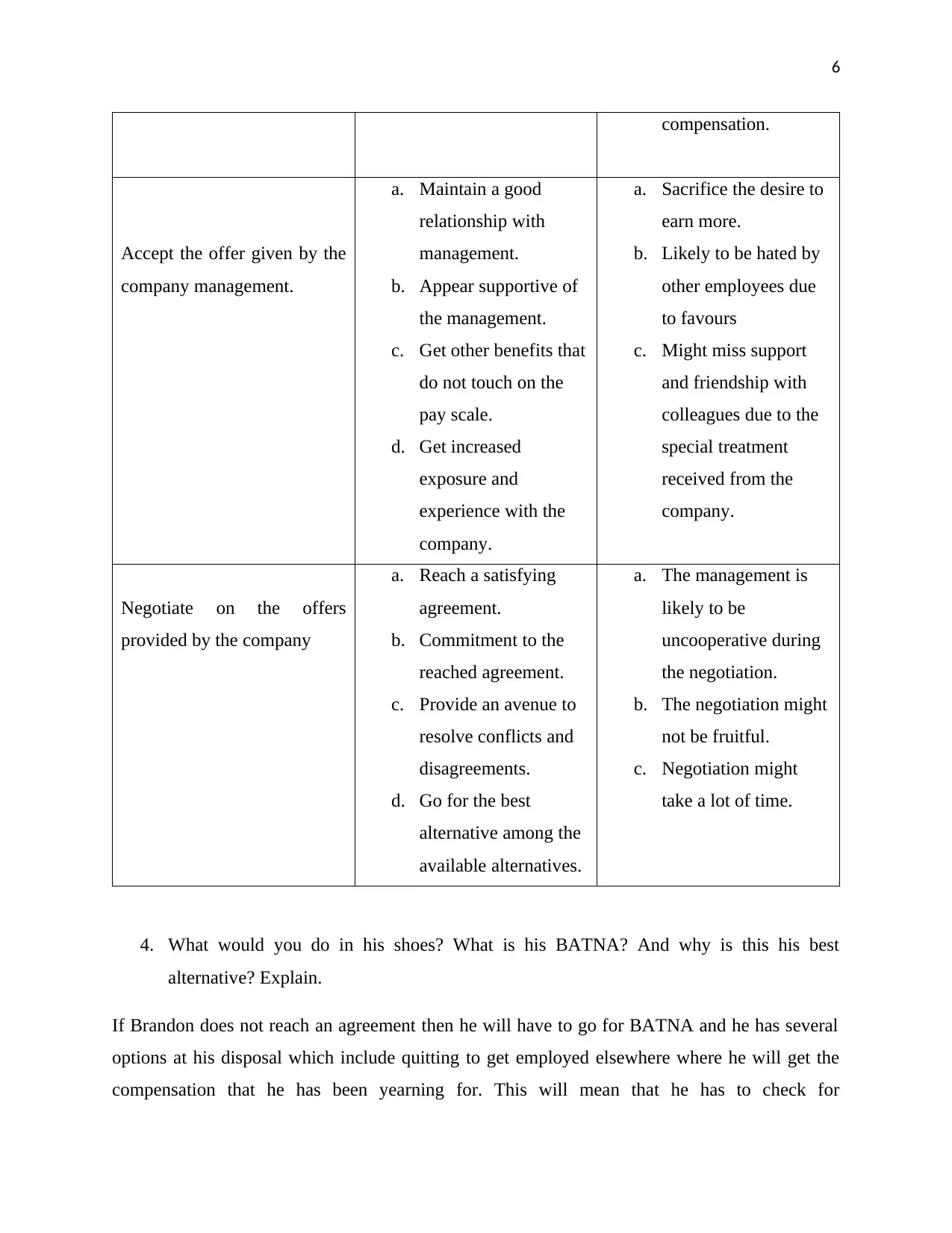
6
compensation.
Accept the offer given by the
company management.
a. Maintain a good
relationship with
management.
b. Appear supportive of
the management.
c. Get other benefits that
do not touch on the
pay scale.
d. Get increased
exposure and
experience with the
company.
a. Sacrifice the desire to
earn more.
b. Likely to be hated by
other employees due
to favours
c. Might miss support
and friendship with
colleagues due to the
special treatment
received from the
company.
Negotiate on the offers
provided by the company
a. Reach a satisfying
agreement.
b. Commitment to the
reached agreement.
c. Provide an avenue to
resolve conflicts and
disagreements.
d. Go for the best
alternative among the
available alternatives.
a. The management is
likely to be
uncooperative during
the negotiation.
b. The negotiation might
not be fruitful.
c. Negotiation might
take a lot of time.
4. What would you do in his shoes? What is his BATNA? And why is this his best
alternative? Explain.
If Brandon does not reach an agreement then he will have to go for BATNA and he has several
options at his disposal which include quitting to get employed elsewhere where he will get the
compensation that he has been yearning for. This will mean that he has to check for
compensation.
Accept the offer given by the
company management.
a. Maintain a good
relationship with
management.
b. Appear supportive of
the management.
c. Get other benefits that
do not touch on the
pay scale.
d. Get increased
exposure and
experience with the
company.
a. Sacrifice the desire to
earn more.
b. Likely to be hated by
other employees due
to favours
c. Might miss support
and friendship with
colleagues due to the
special treatment
received from the
company.
Negotiate on the offers
provided by the company
a. Reach a satisfying
agreement.
b. Commitment to the
reached agreement.
c. Provide an avenue to
resolve conflicts and
disagreements.
d. Go for the best
alternative among the
available alternatives.
a. The management is
likely to be
uncooperative during
the negotiation.
b. The negotiation might
not be fruitful.
c. Negotiation might
take a lot of time.
4. What would you do in his shoes? What is his BATNA? And why is this his best
alternative? Explain.
If Brandon does not reach an agreement then he will have to go for BATNA and he has several
options at his disposal which include quitting to get employed elsewhere where he will get the
compensation that he has been yearning for. This will mean that he has to check for
⊘ This is a preview!⊘
Do you want full access?
Subscribe today to unlock all pages.

Trusted by 1+ million students worldwide
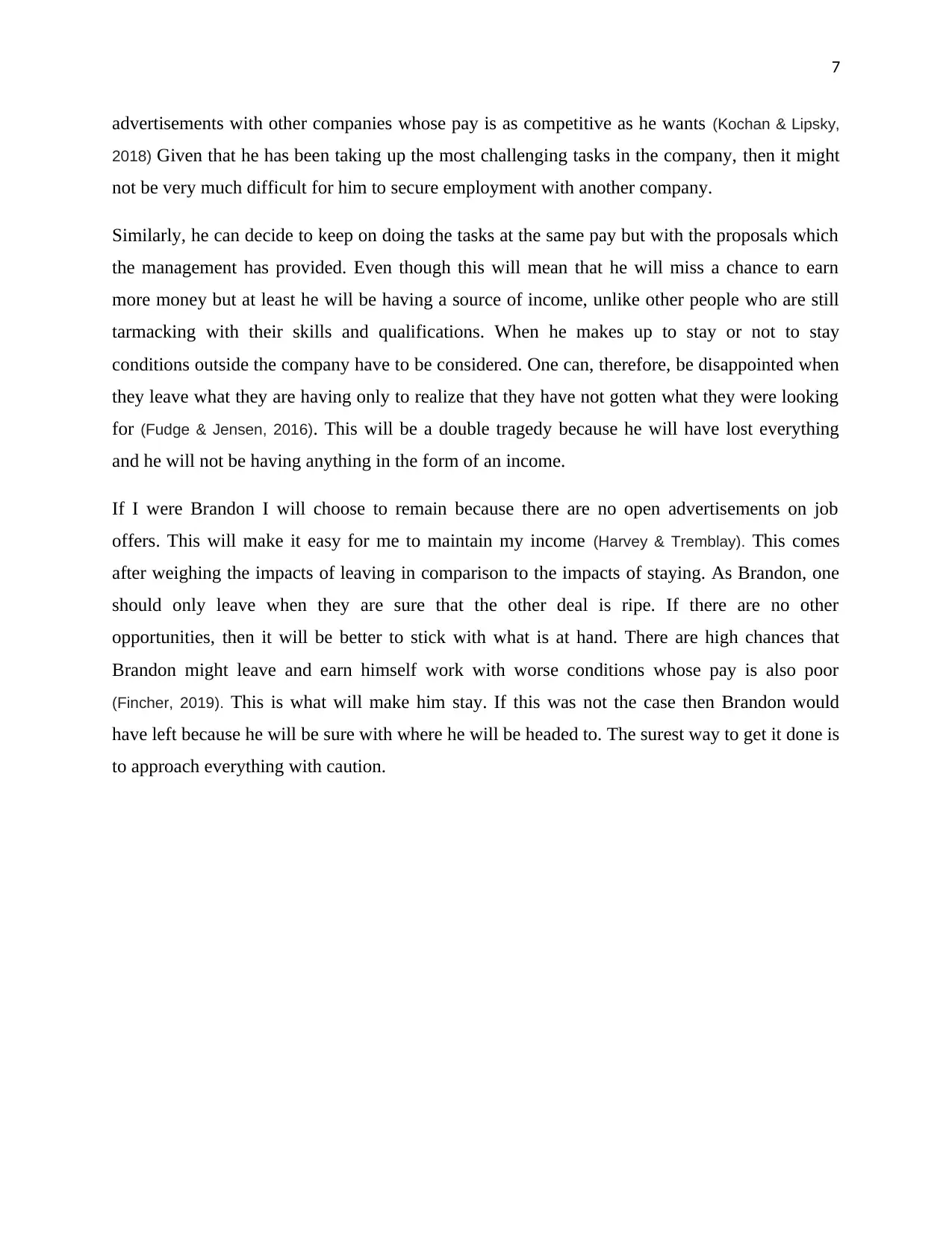
7
advertisements with other companies whose pay is as competitive as he wants (Kochan & Lipsky,
2018) Given that he has been taking up the most challenging tasks in the company, then it might
not be very much difficult for him to secure employment with another company.
Similarly, he can decide to keep on doing the tasks at the same pay but with the proposals which
the management has provided. Even though this will mean that he will miss a chance to earn
more money but at least he will be having a source of income, unlike other people who are still
tarmacking with their skills and qualifications. When he makes up to stay or not to stay
conditions outside the company have to be considered. One can, therefore, be disappointed when
they leave what they are having only to realize that they have not gotten what they were looking
for (Fudge & Jensen, 2016). This will be a double tragedy because he will have lost everything
and he will not be having anything in the form of an income.
If I were Brandon I will choose to remain because there are no open advertisements on job
offers. This will make it easy for me to maintain my income (Harvey & Tremblay). This comes
after weighing the impacts of leaving in comparison to the impacts of staying. As Brandon, one
should only leave when they are sure that the other deal is ripe. If there are no other
opportunities, then it will be better to stick with what is at hand. There are high chances that
Brandon might leave and earn himself work with worse conditions whose pay is also poor
(Fincher, 2019). This is what will make him stay. If this was not the case then Brandon would
have left because he will be sure with where he will be headed to. The surest way to get it done is
to approach everything with caution.
advertisements with other companies whose pay is as competitive as he wants (Kochan & Lipsky,
2018) Given that he has been taking up the most challenging tasks in the company, then it might
not be very much difficult for him to secure employment with another company.
Similarly, he can decide to keep on doing the tasks at the same pay but with the proposals which
the management has provided. Even though this will mean that he will miss a chance to earn
more money but at least he will be having a source of income, unlike other people who are still
tarmacking with their skills and qualifications. When he makes up to stay or not to stay
conditions outside the company have to be considered. One can, therefore, be disappointed when
they leave what they are having only to realize that they have not gotten what they were looking
for (Fudge & Jensen, 2016). This will be a double tragedy because he will have lost everything
and he will not be having anything in the form of an income.
If I were Brandon I will choose to remain because there are no open advertisements on job
offers. This will make it easy for me to maintain my income (Harvey & Tremblay). This comes
after weighing the impacts of leaving in comparison to the impacts of staying. As Brandon, one
should only leave when they are sure that the other deal is ripe. If there are no other
opportunities, then it will be better to stick with what is at hand. There are high chances that
Brandon might leave and earn himself work with worse conditions whose pay is also poor
(Fincher, 2019). This is what will make him stay. If this was not the case then Brandon would
have left because he will be sure with where he will be headed to. The surest way to get it done is
to approach everything with caution.
Paraphrase This Document
Need a fresh take? Get an instant paraphrase of this document with our AI Paraphraser
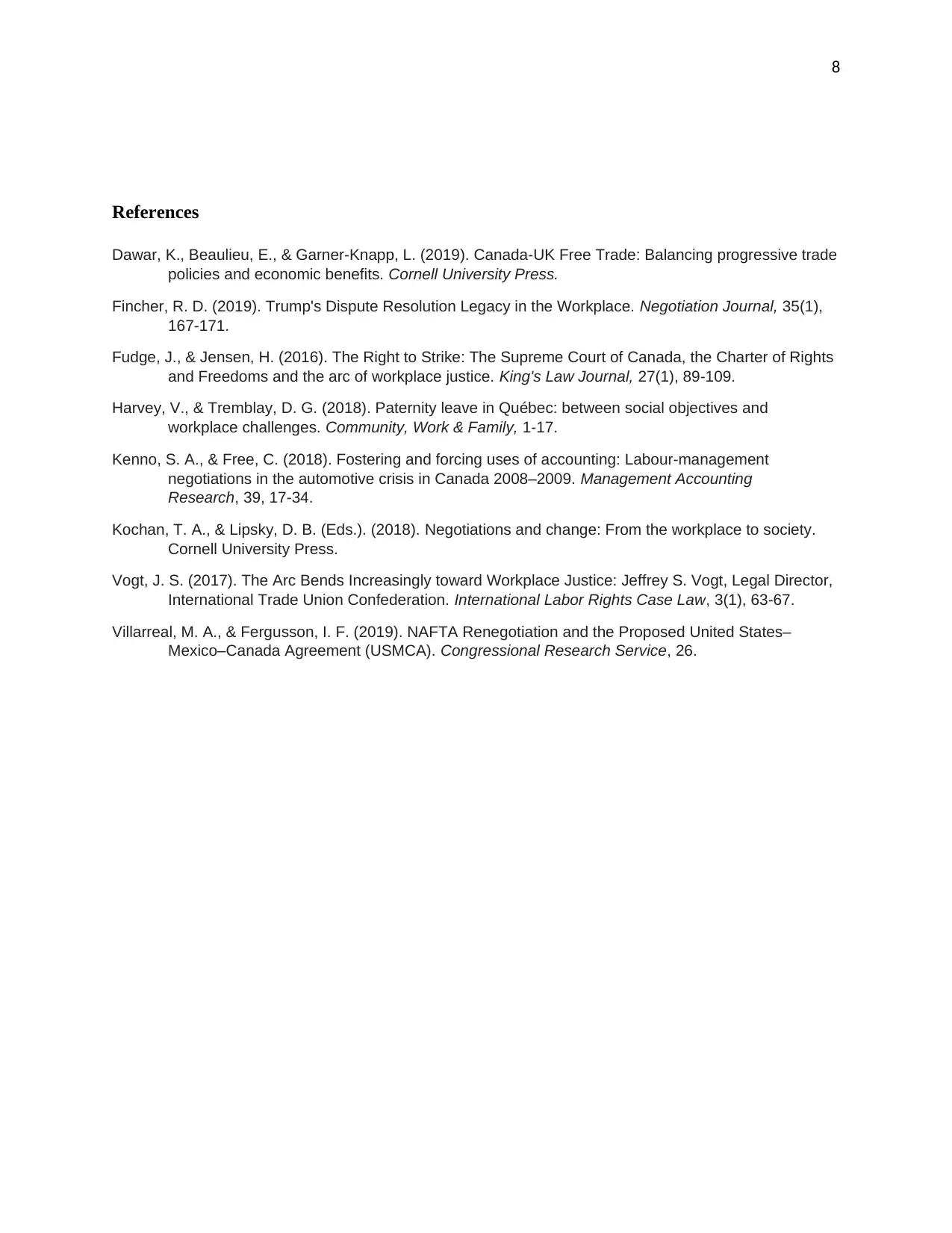
8
References
Dawar, K., Beaulieu, E., & Garner-Knapp, L. (2019). Canada-UK Free Trade: Balancing progressive trade
policies and economic benefits. Cornell University Press.
Fincher, R. D. (2019). Trump's Dispute Resolution Legacy in the Workplace. Negotiation Journal, 35(1),
167-171.
Fudge, J., & Jensen, H. (2016). The Right to Strike: The Supreme Court of Canada, the Charter of Rights
and Freedoms and the arc of workplace justice. King's Law Journal, 27(1), 89-109.
Harvey, V., & Tremblay, D. G. (2018). Paternity leave in Québec: between social objectives and
workplace challenges. Community, Work & Family, 1-17.
Kenno, S. A., & Free, C. (2018). Fostering and forcing uses of accounting: Labour-management
negotiations in the automotive crisis in Canada 2008–2009. Management Accounting
Research, 39, 17-34.
Kochan, T. A., & Lipsky, D. B. (Eds.). (2018). Negotiations and change: From the workplace to society.
Cornell University Press.
Vogt, J. S. (2017). The Arc Bends Increasingly toward Workplace Justice: Jeffrey S. Vogt, Legal Director,
International Trade Union Confederation. International Labor Rights Case Law, 3(1), 63-67.
Villarreal, M. A., & Fergusson, I. F. (2019). NAFTA Renegotiation and the Proposed United States–
Mexico–Canada Agreement (USMCA). Congressional Research Service, 26.
References
Dawar, K., Beaulieu, E., & Garner-Knapp, L. (2019). Canada-UK Free Trade: Balancing progressive trade
policies and economic benefits. Cornell University Press.
Fincher, R. D. (2019). Trump's Dispute Resolution Legacy in the Workplace. Negotiation Journal, 35(1),
167-171.
Fudge, J., & Jensen, H. (2016). The Right to Strike: The Supreme Court of Canada, the Charter of Rights
and Freedoms and the arc of workplace justice. King's Law Journal, 27(1), 89-109.
Harvey, V., & Tremblay, D. G. (2018). Paternity leave in Québec: between social objectives and
workplace challenges. Community, Work & Family, 1-17.
Kenno, S. A., & Free, C. (2018). Fostering and forcing uses of accounting: Labour-management
negotiations in the automotive crisis in Canada 2008–2009. Management Accounting
Research, 39, 17-34.
Kochan, T. A., & Lipsky, D. B. (Eds.). (2018). Negotiations and change: From the workplace to society.
Cornell University Press.
Vogt, J. S. (2017). The Arc Bends Increasingly toward Workplace Justice: Jeffrey S. Vogt, Legal Director,
International Trade Union Confederation. International Labor Rights Case Law, 3(1), 63-67.
Villarreal, M. A., & Fergusson, I. F. (2019). NAFTA Renegotiation and the Proposed United States–
Mexico–Canada Agreement (USMCA). Congressional Research Service, 26.
1 out of 8
Related Documents
Your All-in-One AI-Powered Toolkit for Academic Success.
+13062052269
info@desklib.com
Available 24*7 on WhatsApp / Email
![[object Object]](/_next/static/media/star-bottom.7253800d.svg)
Unlock your academic potential
Copyright © 2020–2026 A2Z Services. All Rights Reserved. Developed and managed by ZUCOL.





